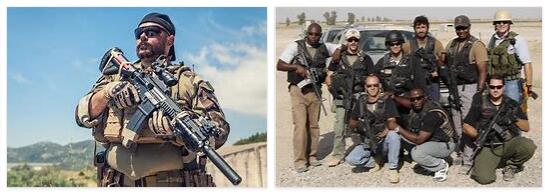4: The scope
Although the PMC operates almost worldwide, there is no place where the extent of their involvement is greater than in Iraq. There has been an explosive increase in both the number of personnel and companies involved in the country. In 2003–2004, about 20,000 people were employed in various PMCs in Iraq, which took care of everything from guarding and security to interrogating prisoners. In 2007, the number had grown to 180,000 – 20,000 more than the total number of American soldiers in Iraq.
This figure includes companies in all categories of PMC. Of the companies operating in the “sharp end” of armed missions in Iraq, just over 48,000 are spread over about 180 companies (Private Security Company Association of Iraq).
In Afghanistan, the scale is far from as large as in Iraq, but even there there has been a sharp increase in the private security market since the fall of the Taliban regime in 2001. Although there is some uncertainty about the numbers, 90 companies have been identified. with between 18,500 and 28,000 employees within the “sharp end” of the PMC. Many of the same companies operating in Iraq are also involved in Afghanistan.
Although there is also a tendency in Iraq for Iraqis to become increasingly involved in staffing the companies, the market in Afghanistan stands out in that as many as 44% of the companies are Afghan-owned and operated. Although several companies with foreign ownership and staffing operate there, it is very common to have Afghan partners on the ownership side and a large number of local employees.
5: Political consequences
Normally, a state’s military forces are closely and directly politically controlled, and political leadership will relatively quickly lead to action in military units. When a third party in the form of a PMC is hired to solve military tasks, the political control becomes less direct . The use of PMC means, in a sense, that parts of the military power are subject to the rules and logic of the business world. Contracts, supply and demand then become factors that will greatly affect the possibilities of military power.
The private military market is lucrative ; according to fun-wiki, the big PMCs turn over hundreds of millions of dollars a year. Close ties between such PMCs, other multinational companies and politicians enable them to influence political decisions through networking and lobbying. Since their business activities are dependent on war and conflict , it is very likely that they will use their influence to increase military efforts in ongoing conflicts. They can also push for military instruments and solutions to be chosen over others in new conflicts.
Developments have reached the point where several Western states, especially the United States, have become dependent on the PMC. These companies contribute many of the tasks that were previously performed by the state’s own soldiers. It will therefore be very difficult for the United States, for example, to maintain its military involvement in Iraq and Afghanistan without the efforts of these companies. This dependency allows the PMC to set the prices of its services and thus influence the extent to which a state is capable of solving military tasks.
By using the PMC, some of the unpleasant aspects of military power are also kept at arm’s length from politicians. Losses in the form of killed and injured among PMC employees do not have the same political consequences as when the state’s own soldiers are victims. This distance can make it easier to carry out military operations of dubious legitimacy and legality. Such mechanisms can therefore help to lower the threshold for the use of military force.
Although the PMC primarily works for states, they also find many clients among non-governmental organizations (NGOs), intergovernmental organizations and larger multinational companies. In situations where the PMC solves assignments on behalf of other private companies, a situation arises where the military power is totally disconnected from political control and management.
PMC operates in a legal gray zone . In practice, they are placed outside international humanitarian law and enjoy almost immunity (here: impunity) when they commit abuses and criminal acts in the service. The form of company they establish means that they avoid being covered by the Geneva Conventions’ definition of mercenaries. Nor are they covered by the UN Convention against the Recruitment, Use, Financing and Training of Mercenaries.
The PMC is also not legally considered part of a state’s armed forces. States that use their services thus have no legal responsibility for the tasks they outsource to the PMC, or for actions performed by PMC personnel. Many – also within the UN system – equate PMC with mercenary activities, among them the UN Special Rapporteur on Mercenary Activities. The problem seems to be that existing legislation is insufficient and that the will to do something about it does not have broad enough international support.









